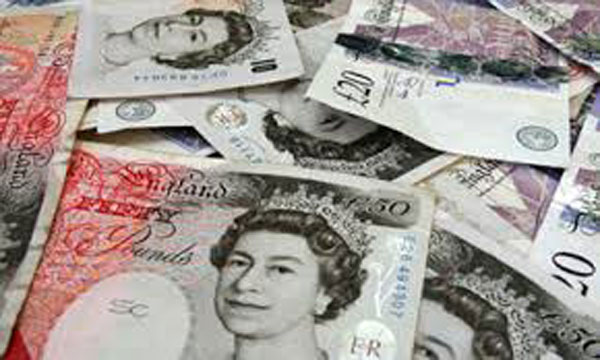Thursday, 03 September 2015 17:29
 LONDON: Sterling fell against the dollar and the euro on Thursday after Britain’s dominant services sector grew at its weakest pace in more than two years in August, adding to doubts over when the Bank of England can raise interest rates.
LONDON: Sterling fell against the dollar and the euro on Thursday after Britain’s dominant services sector grew at its weakest pace in more than two years in August, adding to doubts over when the Bank of England can raise interest rates.
Markit/CIPS Purchasing Managers’ Index (PMI) for Britain’s services industry dropped in August to its lowest since May 2013 at 55.6, down from 57.4 in July.
That was well below economists’ forecasts of a 57.6 reading.
Markit added Britain’s overall economic growth rate was likely to slow to 0.5 percent in the three months to September from an above-average 0.7 percent in the second quarter.
Sterling fell to $ 1.5248, down 0.3 percent on the day, having traded at $ 1.5263 beforehand.
The euro inched up to trade at 73.65 pence, compared with 73.60 beforehand.
The services sector survey came a day after data showed UK construction sector grew at a weaker-than-expected pace, while the manufacturing sector PMI survey also missed expectations.
“The overall weaker set of August purchasing managers’ surveys for services, manufacturing and construction will likely fuel belief that the BoE will not be raising interest rates until well into 2016,” said Howard Archer, chief UK and European economist at IHS Global.
Britain is still one of the fastest-growing economies in the developed world but that may not be sustainable given the weakness globally.
In addition, UK inflation is virtually zero, making it tough for the BoE to justify higher rates.
It is also not expected to raise interest rates before the US Federal Reserve starts to hike.
Sterling has lost more than 3 percent on a trade-weighted basis in the last two weeks alone as investors have pushed back the timing of the first rate hike, given renewed market ructions and worries about a China-led global slowdown.
BoE Governor Mark Carney said on Saturday in Jackson Hole, Wyoming, that a slowdown in China’s economy could push down inflation further but it did not change, for now, the central bank’s position on when and how it might raise rates.
The earliest sterling money markets expect the BoE to move is around March/April next year.




























